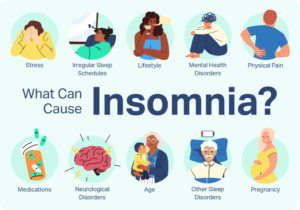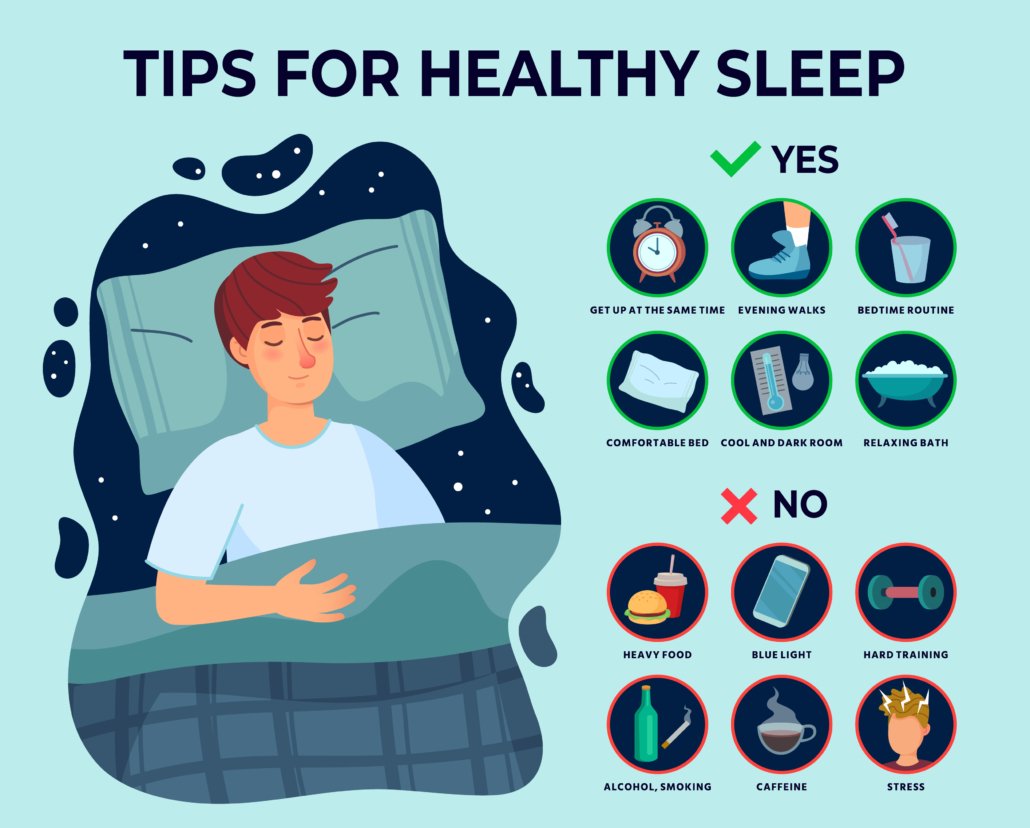Insomnia is a common problem that makes it hard for people to fall asleep or stay asleep through the night. If you find yourself lying awake at night, you might be dealing with insomnia. This can leave you feeling tired and grumpy the next day, making it hard to enjoy your daily activities.
In this blog post, we will explore what insomnia is and how it affects your sleep. We’ll also share simple tips and tricks to help you get a good night’s sleep and feel more rested. Keep reading to learn how you can say goodbye to sleepless nights!
What is Insomnia? A Simple Explanation
Insomnia is when you have trouble falling asleep or staying asleep at night. If you find yourself tossing and turning, unable to get a good night’s rest, you might be experiencing this condition. It can make you feel tired and grumpy during the day because your body didn’t get the rest it needed.
People with insomnia might lie awake for hours or wake up too early and can’t go back to sleep. This can affect how they feel and act each day. Learning about insomnia helps you understand why it’s happening and what you can do to feel better.
A good way to think about insomnia is that it’s like a sleep thief. It sneaks away your chance to rest properly, leaving you feeling worn out. Knowing what insomnia is can be the first step towards getting back to a good night’s sleep.
Signs You Might Have Insomnia
If you’re having trouble sleeping, you might notice some signs that point to insomnia. One common sign is having trouble falling asleep even when you’re tired. You might lie in bed for a long time, but sleep doesn’t come easily.
Another sign is waking up too early and not being able to go back to sleep. You might also feel tired and irritable during the day because your sleep wasn’t restful. Recognizing these signs can help you understand if you have insomnia and need to make changes.
People with insomnia often feel frustrated and stressed because they can’t get a good night’s rest. If you see these signs in yourself, it’s important to look for ways to improve your sleep. Taking action early can help you feel better and get the rest you need.
Common Causes of Insomnia
There are many reasons why someone might experience insomnia. Stress and worry are big culprits. If you have a lot on your mind or are feeling anxious, it can be hard to relax enough to fall asleep.
Another cause can be poor sleep habits, like staying up too late or using screens before bed. These habits can trick your brain into thinking it’s still daytime. Medical conditions and certain medications can also make it difficult to sleep well.
Understanding what causes your insomnia is important because it helps you find the right solutions. Addressing the cause can lead to better sleep and help you feel more rested during the day.
How Insomnia Affects Your Health
Insomnia can have a big impact on your health. When you don’t get enough sleep, it can affect how your body works. You might feel tired, have trouble concentrating, and find it hard to enjoy daily activities.
Lack of sleep from insomnia can also affect your mood. You might feel more irritable or stressed than usual. Over time, this can lead to other health problems, like a weakened immune system or increased risk of chronic diseases.
Taking care of insomnia is important for your overall health. Getting good sleep helps your body function better and keeps you feeling happier and more energetic each day.
Easy Tips to Help You Sleep Better
There are simple things you can do to improve your sleep if you have insomnia. One tip is to set a regular bedtime and wake-up time. Going to bed and waking up at the same time each day can help train your body to sleep better.
Another helpful tip is to create a relaxing bedtime routine. Doing calming activities before bed, like reading or taking a warm bath, can signal to your body that it’s time to wind down. Also, try to avoid screens and bright lights in the evening.
Making these small changes can make a big difference in how well you sleep. They help your body and mind relax, making it easier to fall asleep and stay asleep throughout the night.
The Role of Sleep Diaries in Managing Insomnia
A sleep diary is a useful tool for managing insomnia. It’s like a journal where you record your sleep patterns, including when you go to bed, when you wake up, and how many times you wake up during the night.
By keeping a sleep diary, you can spot patterns and identify things that might be affecting your sleep. For example, you might notice that certain habits or activities are making your insomnia worse.
Reviewing your sleep diary with your doctor can help you and them understand what’s causing your insomnia. This information can guide you in making changes that lead to better sleep.
Understanding Cognitive Behavioral Therapy for Insomnia
Cognitive Behavioral Therapy for Insomnia (CBT-I) is a treatment that helps people with insomnia by changing how they think and act about sleep. This therapy focuses on fixing unhelpful thoughts and behaviors that keep you awake at night.
CBT-I usually involves learning new sleep habits, like setting a regular sleep schedule and creating a calm bedtime routine. It also helps you deal with worries and stress that can interfere with sleep.
The goal of CBT-I is to help you develop healthy sleep patterns and reduce anxiety about sleep. This approach is often very effective in improving sleep and helping you feel more rested.
How to Create a Sleep-Friendly Environment
Creating a sleep-friendly environment can help you get better rest. Start by making your bedroom quiet and dark. Using blackout curtains and earplugs can help block out noise and light that might disturb your sleep.
Another tip is to keep your bedroom cool and comfortable. A cool, comfortable room helps your body relax and fall asleep more easily. Make sure your mattress and pillows are comfortable, as well.
These simple changes can make a big difference in how well you sleep. A sleep-friendly environment helps create the perfect setting for a good night’s rest.
Relaxation Techniques to Combat Insomnia
Relaxation techniques are helpful for people with insomnia. One method is progressive muscle relaxation, where you tense and then relax different muscle groups in your body. This can help reduce stress and make it easier to fall asleep.
Breathing exercises are another useful technique. Deep, slow breaths can help calm your mind and body, preparing you for sleep. Try focusing on your breathing and letting go of any worries.
Using these relaxation techniques can help you wind down and prepare for a good night’s sleep. They reduce anxiety and tension, making it easier to drift off.
When to See a Doctor for Insomnia
If you’ve tried different methods to improve your sleep and still have trouble, it might be time to see a doctor. They can help identify any underlying health issues that might be causing your insomnia.
A doctor can also recommend treatments or therapies that might be more effective. They might suggest things like cognitive behavioral therapy or medications if needed.
Seeing a doctor for insomnia is important if your sleep problems are affecting your daily life. Getting professional help can lead to better sleep and improve your overall well-being.
Over-the-Counter Sleep Aids: What You Need to Know
Over-the-counter sleep aids are medicines you can buy without a prescription. They often contain antihistamines that can make you feel sleepy. However, they are not meant for regular use.
These sleep aids can help you fall asleep, but they might have side effects, like daytime drowsiness or dizziness. It’s important to use them only as needed and not rely on them for long-term sleep issues.
Always talk to your doctor before using over-the-counter sleep aids. They can provide advice on whether they are right for you and how to use them safely.
Prescription Medicines for Insomnia: Pros and Cons
Prescription medicines for insomnia can help you fall asleep or stay asleep, but they come with pros and cons. These medicines are usually prescribed when other methods haven’t worked.
Some prescription medicines are effective in improving sleep, but they can also have side effects. These might include grogginess during the day or a risk of becoming dependent on the medication.
It’s important to discuss the benefits and risks of prescription medicines with your doctor. They can help you choose the best option and ensure you use the medication safely and effectively.
Conclusion:
In summary, insomnia is a common problem that makes it hard to fall asleep or stay asleep. Knowing what insomnia is and how it affects your health can help you find ways to get better rest. Simple changes like setting a regular bedtime, creating a calming routine, and using relaxation techniques can make a big difference.
If you find that these tips don’t work, it’s important to talk to a doctor. They can help you find the right treatment for your sleep problems. Remember, getting good sleep is important for feeling happy and healthy, so don’t hesitate to seek help if you need it.








